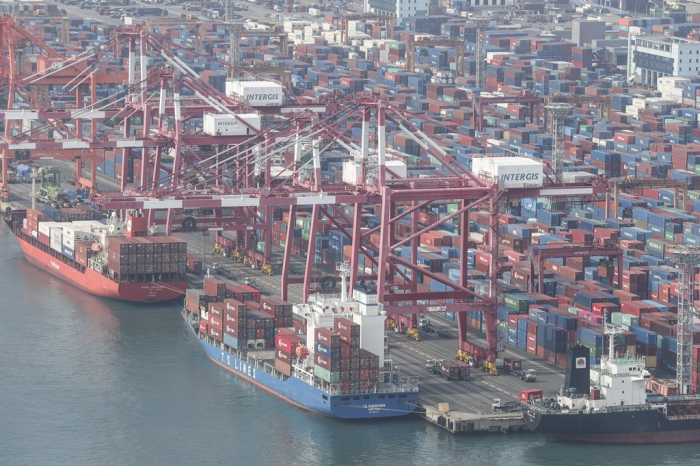Economy
Korea’s November exports top $60 bn for first time to fresh high
Semiconductor exports jump 40.1%; petrochemicals, steel surge 63%, 45.9%
By Dec 01, 2021 (Gmt+09:00)
1
Min read
Most Read
LG Chem to sell water filter business to Glenwood PE for $692 million


Kyobo Life poised to buy Japan’s SBI Group-owned savings bank


KT&G eyes overseas M&A after rejecting activist fund's offer


StockX in merger talks with Naver’s online reseller Kream


Mirae Asset to be named Korea Post’s core real estate fund operator



South Korea’s exports in November exceeded $60 billion for the first time in terms of monthly shipments to an all-time high, although caution has emerged over the potential impact on overseas demand from a resurgence in the pandemic with the onset of the Omicron variant.
Exports surged 32% from a year earlier to $60.4 billion last month, the largest annual increase since the country started compiling such data in 1956, according to the Ministry of Trade, Industry and Energy on Dec. 1.
Strong exports were among the factors that allowed the Bank of Korea to raise interest rates.
Overseas shipments of Asia’s fourth-largest economy have been increasing since November 2020, reporting double-digit growth for a ninth straight month from March of this year. Exports totaled $583.8 billion in the first 11 months of the year, adding to predictions that this year’s sales are likely to exceed the current annual record of $604.9 billion in 2018.
In November, exports of 13 products out of the country’s key 15 items rose on-year with semiconductor, petrochemicals and steel up 40.1%, 63% and 45.9%, respectively.
On the other hand, overseas sales of auto parts dipped 2.2%, extending a losing streak to three months, as the sustained automotive chip shortage continued to disrupt automobile production.
Imports also surged 43.6% to $57.4 billion as purchases of commodities jumped. Crude oil and bituminous coal imports soared 127.8% and 166.9%, respectively. The higher imports cut a trade surplus by 46.8% to $3.1 billion from a year earlier.
Exports are, however, predicted to slow down from this month as some countries toughened restrictions against the COVID-19 due to the spread of the Omicron variant.
“The impact of the new variant has not been reflected in November exports,” said Moon Dong-min, deputy minister for trade and investment. “We will pursue the necessary measures while observing how the spread of the Omicron impacts exports."
Write to Eui-Jin Jeong at justin@hankyung.com
Jongwoo Cheon edited this article.
More to Read
-
 EconomyKorean inflation nears 10-year peak in November, fanning rate hike views
EconomyKorean inflation nears 10-year peak in November, fanning rate hike viewsDec 02, 2021 (Gmt+09:00)
1 Min read -
 Banking & FinanceBank of Korea raises interest rates, signals further hikes
Banking & FinanceBank of Korea raises interest rates, signals further hikesNov 25, 2021 (Gmt+09:00)
3 Min read -

-

Comment 0
LOG IN


